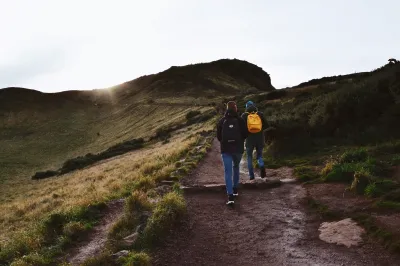
Climate anxiety is a feeling that I know all too well, characterised by a chronic fear of environmental doom. Ironically, this feeling of heightened stress about the state of our planet was a product of the most life-defining relationship I have ever known … my romance with the earth, writes Daze Aghaji, climate activist and creative.
Finding a relationship with nature
Let's journey back to circa 2014, when I, a hardcore city girl, found myself living in the green and pleasant land of the English countryside. At the time, I resided in a boarding house in Lincolnshire, where like most countryside places, there were vast acres of disused land. My house parents encouraged me to turn a small patch of the land into a vegetable garden.
This marked the beginning of a love story like I've never known before. Watching the small seeds grow into an abundant supply of nourishment taught me the importance of regeneration. “As we take, we must give back, and only then can we create sustainable relationships based on love, duty, and care.”
Experiencing the ups and downs of falling in love
These principles are ones that I have brought into my own relationships with others, not just the non-human world. As I fell in love through these devotional acts, the care that I had for the planet's well-being grew. This was tested when I accidentally found out about the climate crisis, and there, I experienced my first heartbreak. Discovering that the same thing that filled me with so much joy and wonder was under threat spun me into a journey of climate anxiety.
Later, I came to understand through this heartbreak, I was experiencing grief for the changes occurring to the earth and for what has already been lost. Without my deep connection to nature, I would be incapable of truly feeling the pain of what is happening to the earth as if it were my own pain. Due to numerous historical events, such as the enclosures (the privatisation of commonly owned land), we have lost our connection to the land, and as a result, we have also lost the empathy we once held towards the place our ancestors considered as sacred. In this modern world, our relationship with nature has become distorted, and many no longer hear the intrinsic calling to protect our home.
Recently, the younger generations have attempted to rebuild a relationship with the earth while attempting to find refuge from a world that is much different from the stable one we were promised. However, this has made us more susceptible to being affected by eco-anxiety. Not just because we have this relationship with the earth but because we know how this one relationship can shape every other relationship we hold dear; and would ever hold dear in our lifetimes.
Aiding to love again
Growing up, my mother and I had a close relationship, sharing common interests like fashion, food and more. However, we didn't see eye-to-eye when it came to the importance of nurturing our relationship with the environment. This lack of alignment made it challenging for me to connect with her, especially during the early stages of my battle with eco-anxiety. I felt a sense of distance, knowing that she wouldn't understand what I was going through.
Unfortunately, many people experience the same sense of not being heard or understood when it comes to climate doom. When I was struggling, I thought back to my vegetable garden and the importance of caring for something you love. So I encouraged my mother to recall her own childhood memories, including vivid recollections of her mother's garden in the Niger Delta. As she recounted endless stories of running through sugar cane fields with her siblings or foraging herbs for her mother's soups, I saw a connection to the land spark in her eyes.
Finally, when I expressed my strong grief and anxiety for the planet, my mother understood. In that moment, she held me, not just physically but emotionally. Her love for me ignited her own journey to becoming an advocate for the earth in her own way. Together, we turned our grief into power and anxiety into action, which positively impacted the communities around us.
What do we need to do for the climate?
It's essential that we all reestablish a relationship with the earth not just for our own benefit, but for the benefit of every relationship we hold dear. We can learn a great deal from the ways relationships are built in ecosystems, where mutual flourishing is the norm. The dandelions and the bees, the mushrooms and the trees are examples of mutualism that we can replicate in our own lives.
To fully understand the climate crisis, we must accept that this is a crisis of relationship. We have been using and abusing ourselves, each other, and the earth. Climate change is a call to action, to repair the damage we have done. By learning from the harmonious life around us and taking action, we can work through our climate anxiety and realise that climate flourishing is also a viable option.
How we can help
If you’re looking for support with your relationships, we can help. We offer a range of ways to speak with a trained relationship expert including ongoing counselling, 30 minute web and phone chats, and one session therapy.
Find out which service is right for you
How you can help
Have you found this advice helpful? Make a donation to help us reach more people and continue supporting the nation’s relationships:
Can't afford to donate? We understand. Instead, we ask that you leave us a 5 star review on Trustpilot.